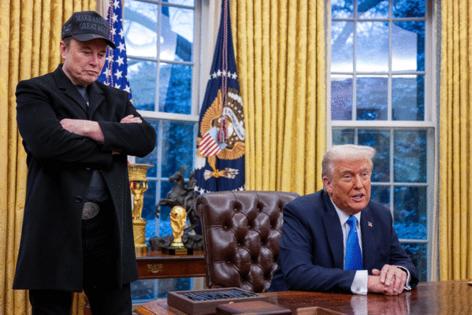Trump to attend G7 leaders' summit in Canada in June
Published in Political News
WASHINGTON — President Donald Trump will attend the Group of Seven summit in June, the White House said, as tensions over trade and his efforts to halt Russia’s war in Ukraine cloud U.S. ties with some of its closest allies.
White House press secretary Karoline Leavitt said Thursday that Trump would attend the gathering from June 15 to 17.
This year’s G7 leaders summit will be held in Kananaskis, Alberta, taking Trump to Canada — a nation whose economy and sovereignty have faced threats from the U.S. president — highlighting how his policies to reshape global trade and defense ties have upended long-standing relationships.
Trump has repeatedly suggested Canada should become the 51st U.S. state and his sweeping tariffs threaten to damage one of the world’s largest trading relationships, with the two neighbors exchanging $916 billion in goods and services in 2024.
Those tensions threaten to complicate the G7 gathering of major economies, which also includes France, Germany, Italy, Japan and the United Kingdom, on Trump’s third international trip since he retook office in January.
Trump’s import taxes will be high on the agenda as U.S. trading partners look to secure deals to avoid higher levies. The president in May unveiled a trade deal with the United Kingdom, though the details fell short of the “full and comprehensive” agreement he cast it as, and the U.S. and China have agreed to slash their tit-for-tat tariffs in a bid to ease negotiations.
Still, the president has indicated he is moving away from engaging in negotiations with many countries and will look to dictate some tariff levels on his own. The sweeping levies on dozens of nations and on key sectors have spurred worries about a global slowdown.
Ahead of the June leaders’ summit, the G7’s top finance ministers, including U.S. Treasury Secretary Scott Bessent, gathered in Canada this week confronting worries about slower growth and higher inflation from the trade war and looking to find common ground.
One area where the G7 may find consensus is over China, as countries have stepped up their trade actions against the largest economy in Asia to better align themselves with the U.S.
A far more contentious issue facing the G7 leaders is support for Ukraine. European allies’ hopes that Trump would raise pressure on Russia to agree to a 30-day ceasefire in Ukraine were dashed earlier in May after he spoke to his Russian counterpart, Vladimir Putin.
Trump said Ukraine and Russia would begin negotiations toward a halt in the fighting after the call, but he offered no sanctions threat or timeline to push Putin toward peace, frustrating Kyiv and its allies. Putin has presented only maximalist demands, confident that his forces hold the upper hand in a war against Ukraine that he launched and which is now in its fourth year.
The summit will be hosted by Canadian Prime Minister Mark Carney, who met with Trump earlier in May, in a bid to reset relations between their countries. Trump regularly mocked Carney’s predecessor, former Prime Minister Justin Trudeau, as a mere “governor.”
While Carney’s White House visit saw Trump offer a more cordial welcome, the president again mused about the U.S. absorbing its northern neighbor, leading the PM to say that his country would never be for sale.
Trump has attended a G7 in Canada before — in 2018, the last time the country hosted the gathering. That summit saw the fractures within the group laid bare as Trump left early and pulled out of signing a joint agreement.
©2025 Bloomberg L.P. Visit bloomberg.com. Distributed by Tribune Content Agency, LLC.

























































Comments